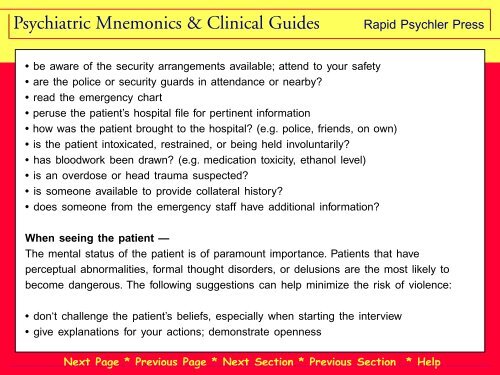Mnemonics
Create successful ePaper yourself
Turn your PDF publications into a flip-book with our unique Google optimized e-Paper software.
Psychiatric <strong>Mnemonics</strong> & Clinical Guides<br />
Rapid Psychler Press<br />
• be aware of the security arrangements available; attend to your safety<br />
• are the police or security guards in attendance or nearby?<br />
• read the emergency chart<br />
• peruse the patient’s hospital file for pertinent information<br />
• how was the patient brought to the hospital? (e.g. police, friends, on own)<br />
• is the patient intoxicated, restrained, or being held involuntarily?<br />
• has bloodwork been drawn? (e.g. medication toxicity, ethanol level)<br />
• is an overdose or head trauma suspected?<br />
• is someone available to provide collateral history?<br />
• does someone from the emergency staff have additional information?<br />
When seeing the patient —<br />
The mental status of the patient is of paramount importance. Patients that have<br />
perceptual abnormalities, formal thought disorders, or delusions are the most likely to<br />
become dangerous. The following suggestions can help minimize the risk of violence:<br />
• don‘t challenge the patient’s beliefs, especially when starting the interview<br />
• give explanations for your actions; demonstrate openness<br />
Next Page * Previous Page * Next Section * Previous Section * Help



